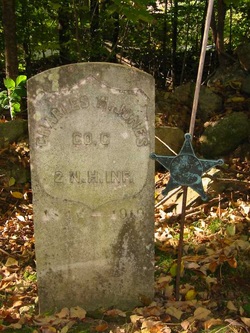Charles Jones was eighteen when he enlisted in the Union Army in September of 1861. The War had been going on for about six months and it was just occurring to both sides that this was not going to be the 90-days dust-up that everyone has assumed it would be. So far as I know, Jones did not leave a diary or any letters, so it's tough to know why he joined up, but his census and military records hint that he was from a poor family and needed the money. He joined the 2nd NH Volunteer Infantry.
Over the next three and a half years, his unit fought in most of the major battles in the Eastern Theater - 2nd Bull Run, Fredericksburg, Gettysburg, Petersburg and Cold Harbor. At one point, his unit was sent back to New Hampshire on furlough and he deserted, but was dragged back and served out the rest of his enlistment. Along the way, he came down with chronic malaria, that plagued him for the rest of his life.
After the War, he worked a series of low-skill, menial jobs, got married and divorced a couple of times and ended up drinking himself to death at the age of 68. His son, who wanted nothing to do with him, sent his outstanding debts on to the Pension Department, which is how we know anything about him. Today, his grave lies more or less forgotten in a corner of another family's private plot.
Looking back on the life of Charles Jones with modern eyes, he seems like a text-book example of Post Traumatic Stress Disorder. Of course, to Victorian eyes, he was the victim of his own moral failings. No matter how you view success in life - money, professional accomplishments, good health, the love and respect of a good family - he didn't have any of that. He died alone and an utter failure in life. The Civil War killed him just as surely as if he'd been shot on the battlefield - it just took fifty years to do it.
Charles Jones didn't just give his life to the Civil War; he gave up his hopes, dreams, self-respect and his future.
During the whole assembly, I couldn't help thinking of Charles Jones, who - willingly or unwillingly - had given up so much for his country and about my own father, a Vietnam vet who has a lot in common with Jones. As the assembly wrapped up and students straggled back to their classrooms, I pulled one of our 8th graders aside - a very nifty girl, whose father is an active duty serviceman and who feels passionately about such things. I asked if she had any plans for lunch and could she do me a favor?
She was agreeable, so I checked with my Assistant Principal and called this girl's mother to get permission to take her off-campus during lunch.
At lunchtime, a colleague, the student and I jumped into my car and drove to the cemetery where Charles Jones is buried. We brought along some lilacs that I cut from a bush at school. We cleaned off his grave and I told the two ladies about Jones' rough life. They placed the lilacs on his grave and we went back to school.
It was only a symbolic gesture, but it seems like the least we could do. After all that he had given up, Charles Jones deserves to have a couple of pretty girls put flowers on his grave.

 RSS Feed
RSS Feed